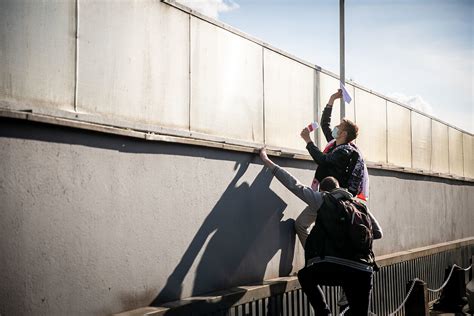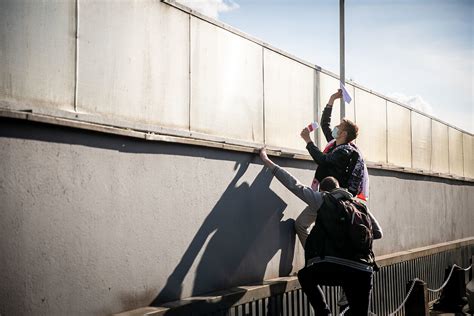
Cars carrying recently released Belarusian dissidents arrived at the U.S. Embassy in Vilnius, Lithuania, on Friday, signaling a significant development following their freedom from imprisonment in Belarus. The dissidents, whose identities and specific charges remain largely undisclosed in initial reports, are believed to be seeking support and potentially asylum after enduring what many international observers have described as politically motivated detentions.
Vilnius, Lithuania—Vehicles transporting freed Belarusian dissidents reached the U.S. Embassy in Vilnius on Friday, marking a pivotal moment for those who have faced political persecution in Belarus. The dissidents, released under circumstances that remain unclear, are now under the protection of U.S. diplomatic personnel in Lithuania, a neighboring country and a member of both the European Union and NATO.
The arrival of the dissidents at the U.S. Embassy underscores the ongoing political turmoil and human rights concerns within Belarus, particularly following the contested 2020 presidential election that saw widespread protests and a brutal crackdown by the government of President Alexander Lukashenko. The U.S. and other Western nations have imposed sanctions on Belarusian officials and entities in response to the government’s actions against dissent.
“This situation highlights the ongoing concerns about human rights and political freedom in Belarus,” said a representative from a human rights organization focusing on Eastern Europe, who spoke on condition of anonymity due to the sensitivity of the matter. “The fact that these individuals sought refuge at the U.S. Embassy underscores the severity of the situation and the lack of faith in the rule of law within Belarus.”
While details regarding the release of the dissidents are scarce, it is believed that back-channel negotiations and diplomatic efforts played a crucial role. The U.S. Embassy in Vilnius has not yet released an official statement regarding the situation, but sources familiar with the matter indicate that discussions are underway to determine the next steps for the dissidents. These steps may include providing humanitarian assistance, facilitating asylum applications, or arranging safe passage to other countries.
The situation also raises questions about the broader geopolitical implications of the ongoing crisis in Belarus. The country’s close ties to Russia have further complicated matters, as Moscow has provided political and economic support to the Lukashenko regime. The U.S. and its allies have expressed concerns about Russia’s increasing influence in Belarus and the potential for further destabilization in the region.
The exact number of dissidents who arrived at the U.S. Embassy remains unconfirmed, but reports suggest that it involves several individuals who have been prominent voices in the Belarusian opposition movement. These individuals have faced charges ranging from participating in unauthorized protests to allegedly plotting to overthrow the government. Many international observers and human rights organizations have condemned these charges as politically motivated and have called for the release of all political prisoners in Belarus.
The Belarusian government has consistently denied allegations of human rights abuses and political repression, claiming that it is acting to maintain order and prevent foreign interference in the country’s internal affairs. However, numerous reports from international organizations, including the United Nations and the Organization for Security and Cooperation in Europe (OSCE), have documented widespread violations of human rights, including arbitrary arrests, torture, and restrictions on freedom of expression and assembly.
The situation in Belarus has also had a significant impact on neighboring countries, particularly Lithuania, Poland, and Ukraine, which have provided support to Belarusian civil society and opposition groups. These countries have also faced challenges related to migration and border security, as many Belarusians have sought refuge from political persecution.
The arrival of the dissidents at the U.S. Embassy in Vilnius is likely to further strain relations between Belarus and the West. It also serves as a reminder of the ongoing struggle for democracy and human rights in Belarus, and the challenges faced by those who dare to speak out against the government. The international community continues to monitor the situation closely and to explore ways to support the Belarusian people in their quest for a more just and democratic society.
The circumstances surrounding the dissidents’ release and subsequent arrival at the embassy are shrouded in uncertainty. It’s unclear whether their release was part of a broader amnesty program, a negotiated agreement, or a unilateral decision by the Belarusian government. Moreover, the specific conditions of their release, such as any restrictions on their movement or speech, remain unknown.
The U.S. government’s response to this situation is also being closely watched. The U.S. has been a vocal critic of the Lukashenko regime and has imposed sanctions on Belarusian officials and entities. The decision to provide refuge to the dissidents at the embassy signals a continued commitment to supporting those who are fighting for democracy and human rights in Belarus. However, the U.S. must also balance its support for the dissidents with the need to avoid escalating tensions with Belarus and Russia.
The arrival of the dissidents in Vilnius also highlights the role of Lithuania as a haven for Belarusian opposition figures and activists. Lithuania has been a strong supporter of the Belarusian pro-democracy movement and has provided refuge to many Belarusians who have fled political persecution. The Lithuanian government has also been vocal in its criticism of the Lukashenko regime and has called for international action to address the human rights situation in Belarus.
The future of Belarus remains uncertain. The Lukashenko regime has shown no signs of easing its grip on power, and the opposition movement faces significant challenges in its efforts to bring about democratic change. However, the arrival of the dissidents at the U.S. Embassy in Vilnius serves as a reminder that the struggle for democracy and human rights in Belarus continues, and that the international community has a responsibility to support those who are fighting for a better future.
The situation also underscores the importance of international diplomacy and cooperation in addressing human rights crises. The release of the dissidents and their subsequent arrival at the U.S. Embassy likely involved complex negotiations and behind-the-scenes diplomacy. The international community must continue to work together to put pressure on the Belarusian government to respect human rights and to release all political prisoners.
Furthermore, the events in Belarus have implications for regional security. The country’s close ties to Russia and its strategic location make it a key player in the region. Any further destabilization in Belarus could have serious consequences for regional security and could potentially lead to a wider conflict. The international community must work to prevent further escalation of tensions and to promote a peaceful resolution to the crisis.
The arrival of the dissidents at the U.S. Embassy in Vilnius is a complex and multifaceted situation with far-reaching implications. It highlights the ongoing human rights crisis in Belarus, the role of international diplomacy in addressing such crises, and the importance of regional security. The international community must continue to monitor the situation closely and to work together to support the Belarusian people in their quest for a more just and democratic society. The situation requires a nuanced approach, balancing the need to support the opposition with the need to avoid escalating tensions with Belarus and Russia.
The long-term impact of these events on Belarus’s political landscape remains to be seen. While the dissidents’ release offers a glimmer of hope, the underlying issues of political repression and human rights abuses persist. The international community’s continued engagement and support will be crucial in fostering a path towards democratic reform and stability in Belarus. The focus should be on promoting dialogue, supporting civil society, and holding those responsible for human rights violations accountable.
The fact that these dissidents sought refuge at the U.S. Embassy also speaks volumes about the lack of trust in the Belarusian legal system and the perceived threat of continued persecution. This highlights the urgent need for judicial reform and the establishment of an independent judiciary in Belarus, which can ensure fair trials and protect the rights of all citizens.
Moreover, the international community should continue to provide humanitarian assistance to Belarusians who have been affected by political repression, including those who have been forced to flee the country. This assistance should include financial support, legal aid, and psychological counseling.
The situation in Belarus is a stark reminder of the challenges faced by pro-democracy movements around the world. It underscores the importance of international solidarity and the need for the international community to stand up for human rights and political freedom, even in the face of authoritarian regimes. The arrival of the Belarusian dissidents at the U.S. Embassy in Vilnius is a call to action, urging the international community to redouble its efforts to support the Belarusian people in their quest for a more just and democratic society. The coming days and weeks will be crucial in determining the fate of these dissidents and the future of Belarus.
The incident also underscores the importance of maintaining open channels of communication with the Belarusian government, even while condemning its human rights record. Dialogue is essential for finding a peaceful resolution to the crisis and for promoting reforms that can improve the lives of the Belarusian people. This dialogue should be conducted in a frank and constructive manner, with a clear focus on human rights and democratic principles.
Finally, the arrival of the dissidents at the U.S. Embassy in Vilnius serves as a reminder that the struggle for democracy is a global struggle. It is a struggle that requires the unwavering commitment of individuals, organizations, and governments around the world. The international community must continue to stand in solidarity with those who are fighting for democracy and human rights in Belarus and in all other countries where these fundamental freedoms are under threat.
The United States’ role in this situation is particularly important. As a leading defender of democracy and human rights, the U.S. has a responsibility to provide support to the Belarusian opposition and to hold the Lukashenko regime accountable for its actions. This support should include financial assistance, political support, and diplomatic pressure. The U.S. should also work with its allies to coordinate a unified response to the crisis in Belarus.
The situation surrounding the Belarusian dissidents in Vilnius also raises questions about the effectiveness of existing international mechanisms for protecting human rights. While the United Nations and other international organizations have condemned the human rights abuses in Belarus, they have been largely unable to prevent them. This highlights the need for strengthening these mechanisms and for finding new ways to hold governments accountable for their human rights records.
The international community must also address the root causes of the crisis in Belarus. This includes promoting economic development, strengthening civil society, and fostering a culture of democracy and respect for human rights. These efforts will require a long-term commitment and a sustained investment of resources.
The arrival of the Belarusian dissidents at the U.S. Embassy in Vilnius is a significant event that underscores the ongoing crisis in Belarus and the challenges faced by those who are fighting for democracy and human rights. The international community must respond to this situation with courage, determination, and a unwavering commitment to the principles of human rights and political freedom. The future of Belarus depends on it.
The strategic implications of the dissidents seeking refuge in a NATO country’s embassy are also noteworthy. It signals a level of desperation and a complete lack of faith in any potential recourse within Belarus itself. This act effectively internationalizes the issue, placing direct pressure on the U.S. and, by extension, its allies to take further action. It also serves as a powerful symbol of resistance against authoritarianism, resonating with pro-democracy movements globally.
Furthermore, the incident highlights the limitations of soft power diplomacy in dealing with entrenched authoritarian regimes. While sanctions and condemnations can exert pressure, they often prove insufficient to bring about meaningful change. The willingness of these dissidents to risk everything to seek external protection underscores the need for more assertive and proactive strategies to support democratic transitions.
The potential ramifications for U.S.-Belarus relations are significant. While relations were already strained, this incident is likely to further deteriorate them. The Lukashenko regime may view the U.S. as actively undermining its authority, leading to retaliatory measures and further restrictions on civil liberties within Belarus.
The broader context of Russian influence in Belarus cannot be ignored. Russia has consistently supported the Lukashenko regime, providing economic and political assistance. Any U.S. actions in support of the dissidents will likely be interpreted by Russia as an attempt to weaken its sphere of influence, potentially leading to increased tensions between the two countries.
The role of technology and social media in disseminating information about the situation in Belarus is also crucial. Despite government censorship, Belarusian activists have been using social media platforms to share information about human rights abuses and to organize protests. The international community must support these efforts by providing resources to bypass censorship and to ensure that the voices of the Belarusian people are heard.
The legal aspects of the dissidents’ situation are also complex. The U.S. government will need to determine their eligibility for asylum or other forms of protection under international law. This process will likely involve careful consideration of their individual circumstances and the evidence of political persecution they have faced in Belarus.
The psychological impact of imprisonment and political persecution on the dissidents cannot be underestimated. Many of them may have suffered trauma and may require psychological support to cope with their experiences. The international community should provide resources for mental health services and other forms of support to help them rebuild their lives.
The events in Vilnius serve as a reminder that the fight for democracy and human rights is a continuous process. Even in countries where democratic institutions are well-established, there is a need to remain vigilant and to defend these fundamental freedoms against those who would seek to undermine them. The situation in Belarus is a test of the international community’s commitment to these principles.
The long-term solution to the crisis in Belarus lies in empowering the Belarusian people to determine their own future. This requires supporting civil society organizations, promoting independent media, and fostering a culture of democracy and respect for human rights. The international community must work together to create an environment in which the Belarusian people can freely exercise their right to choose their own leaders and to shape their own destiny.
The fact that the dissidents chose the U.S. Embassy specifically, as opposed to other embassies in Vilnius, likely reflects a perceived level of commitment from the United States to supporting democratic movements and defending human rights globally. It underscores the enduring importance of American leadership in the promotion of these values.
The international response to this situation will also be a crucial factor in shaping the future of Belarus. A unified and coordinated response from the U.S., the European Union, and other international actors will send a strong message to the Lukashenko regime that its actions are unacceptable and that it will be held accountable for its human rights record.
The situation in Vilnius also highlights the need for greater international cooperation in addressing the challenges posed by authoritarian regimes. These regimes often operate with impunity, knowing that they can rely on the support of other authoritarian states to shield them from international scrutiny. The international community must work together to break this cycle of impunity and to hold all governments accountable for their actions.
The arrival of the Belarusian dissidents at the U.S. Embassy in Vilnius is a moment of both crisis and opportunity. It is a crisis because it underscores the ongoing human rights abuses in Belarus and the challenges faced by those who are fighting for democracy. But it is also an opportunity to reaffirm the international community’s commitment to human rights and to take concrete action to support the Belarusian people in their quest for a more just and democratic society.
Frequently Asked Questions (FAQ)
1. Who are the Belarusian dissidents who arrived at the U.S. Embassy in Vilnius?
While the specific identities haven’t been officially released, these are individuals who have been recently released from imprisonment in Belarus and are believed to be prominent figures in the Belarusian opposition movement. They have faced charges ranging from participating in unauthorized protests to allegedly plotting to overthrow the government, charges widely considered politically motivated by international observers.
2. Why did the dissidents seek refuge at the U.S. Embassy in Vilnius?
The dissidents likely sought refuge at the U.S. Embassy due to a lack of trust in the Belarusian legal system and a perceived threat of continued political persecution. The U.S. has also been a vocal critic of the Lukashenko regime and has imposed sanctions on Belarusian officials and entities, signaling a commitment to supporting those who are fighting for democracy and human rights in Belarus. Seeking refuge in the embassy of a powerful nation like the US also internationalizes their plight.
3. What is the likely response of the U.S. government to this situation?
The U.S. government is likely to provide humanitarian assistance, explore asylum options, and potentially facilitate safe passage for the dissidents to other countries. It will also likely use this situation to further condemn the human rights record of the Lukashenko regime and potentially impose further sanctions. The U.S. will likely balance its support for the dissidents with the need to avoid escalating tensions with Belarus and Russia.
4. What are the potential geopolitical implications of this event?
The event could further strain relations between Belarus and the West, particularly the U.S. and the European Union. It also highlights the ongoing political turmoil and human rights concerns within Belarus, particularly following the contested 2020 presidential election. Russia’s close ties to Belarus could further complicate matters, as Moscow has provided political and economic support to the Lukashenko regime. The US might see this as an opportunity to weaken Russian influence, which could escalate tension between the two countries.
5. What is the role of Lithuania in this situation?
Lithuania has been a strong supporter of the Belarusian pro-democracy movement and has provided refuge to many Belarusians who have fled political persecution. The Lithuanian government has also been vocal in its criticism of the Lukashenko regime and has called for international action to address the human rights situation in Belarus. Vilnius, the capital, has become a hub for Belarusian opposition groups and activists.









